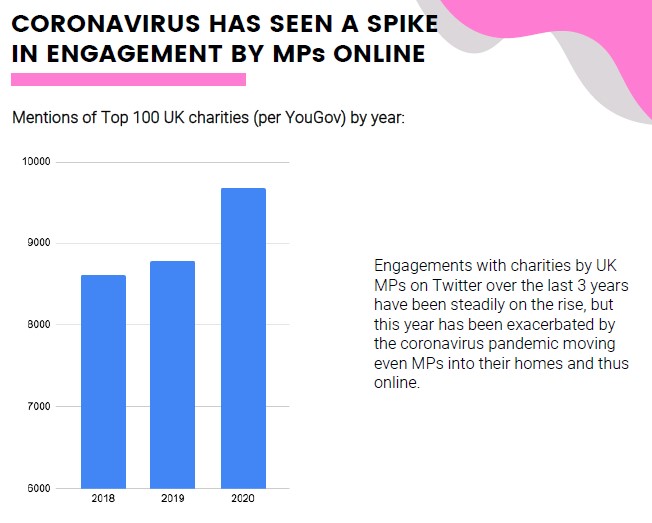
For charity PR and communications pros, the pandemic has heralded a shift online with huge implications for how they contact politicians.
Research by PoliMonitor has shown that engagements with charities by UK MPs on Twitter over the last 3 years has been steadily on the rise, but this year has seen a giant step up as the coronavirus pandemic moved politicians (and their teams) into their homes and online.
This move online was discussed at a recent PRCA Charity and Not For Profit Group event where we heard from charity comms pros, journalists, lobbyists and the communications manager for Tory MP Dehanna Davison.
What united all the speakers was a genuine excitement about how the move online has democratised access to politicians. The shift has seen more opportunities to engage and, as MPs become more comfortable with the technology, there is even an increase in the chances of getting a meeting or phone call with parliamentarians
Online too, politicians from across England, Scotland, Wales and Northern Ireland are taking to engaging with charities and constituents like never before.
PoliMonitor’s research demonstrates how dominating the digital airwaves throughout the lockdown has been the discussion about the impact of these measures on mental health, which saw the largest engagement by politicians ever in October for World Mental Health Day.
Crucially, this spike in engagement led many more politicians than usual to direct followers to the work of Samaritans and the Mental Health Foundation.
MPs, including Prime Minister Boris Johnson, took to Twitter like never before to back the Royal British Legion's annual poppy campaign, whose work in supporting veterans in the midst of coronavirus made their work more important than ever.
Elsewhere, Arts Council England - also a non-departmental public body - received plaudits online for its role in the distribution of the Culture Recovery Fund. The Samaritans
received thanks for their work in tackling loneliness throughout this difficult year in the
midst of lockdown, with politicians using Twitter to highlight the work of Samaritans to their constituents.
But it is not all good news.
The shift online has come with some drawbacks. Most notably a rise in hate speech directed at charities, MPs and their staff. The PRCA has backed the launch of new best practice guidance for charity comms teams in dealing with online hate and it’s clear that this is an issue which will dominate campaigners lives in 2021.
Another continuing issue will be the increase in the volume of correspondence.
While letters to MPs may have decreased, email traffic and direct messages online have increased.
Ellie Varley, Dehanna Davison MP’s communications manager, explained that she reads over 100 emails from constituents a day. So to get their attention, a mass email campaign favoured by many campaigners will not cut through.
Instead, campaigners need to focus on mobilising their supporter database to link issues being highlighted nationally to local issues. All MPs have a duty to respond to their constituents and any social media / mainstream media campaigning will help create a halo effect when the email from a constituent lands.
This poses huge logistical challenges for campaigners, not just in generating sufficiently high profile content, but also in managing the information flow back to the campaign co-ordinator. Feedback loops for grassroots activists to share responses from MPs is just as vital as getting supporters to write in the first place.
Of course, the impact of the pandemic on campaigning is nothing compared to the impact on fundraising and service delivery. However, it shows that as more and more charity functions move online, the integration of digital campaigning into other areas of a charity’s work has become essential.
Simon Francis is Chair of the PRCA Council for 2020 and Founder Member of social enterprise Campaign Collective.
